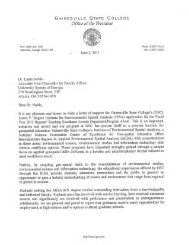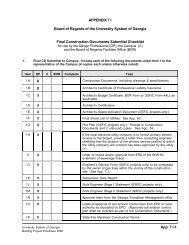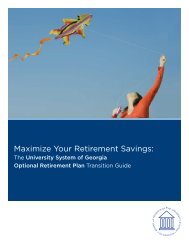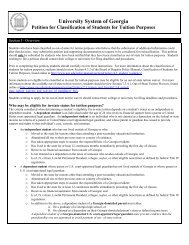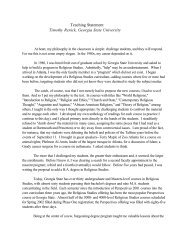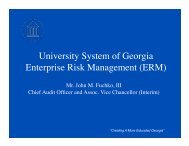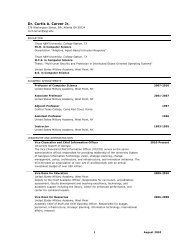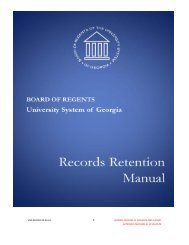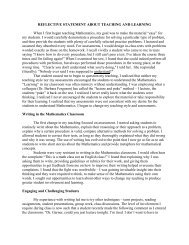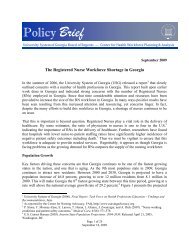66862 Federal Register / Vol. 75, No. 209 / Friday, October 29, 2010 / Rules and RegulationsMEETS STATE AUTHORIZATION REQUIREMENTS *Legal entity Entity description Approval or licensure process<strong>Education</strong>al institution .......................Business ...........................................Charitable organization .....................A public, private nonpr<strong>of</strong>it, or for-pr<strong>of</strong>it institution establishedby name by a State through a charter,statute, or other action issued by an appropriateState agency or State entity as an educational institutionauthorized to operate educational programsbeyond secondary education, includingprograms leading to a degree or certificate.A for-pr<strong>of</strong>it entity established by the State on thebasis <strong>of</strong> an authorization or license to conductcommerce or provide services.A nonpr<strong>of</strong>it entity established by the State on thebasis <strong>of</strong> an authorization or license for the publicinterest or common good.The institution must comply with any applicableState approval or licensure process and be approvedor licensed by name, and may be exemptedfrom such requirement based on its accreditation,or being in operation at least 20years, or use both criteria.The State must have a State approval or licensureprocess, and the institution must comply with theState approval or licensure process and be approvedor licensed by name.An institution in this category may not be exemptedfrom State approval or licensure based on accreditation,years in operation, or a comparableexemption*Notes:• Federal, tribal, and religious institutions are exempt from these requirements.• A State must have a process, applicable to all institutions except tribal and Federal institutions, to review and address complaints directly orthrough referrals.• The chart does not take into requirements related to State reciprocity.WReier-Aviles on DSKGBLS3C1PROD with RULES2ExamplesInstitutions considered legallyauthorized under amended § 600.9:• A college has a royal charter fromthe colonial period recognized by theState as authorizing the institution byname to <strong>of</strong>fer postsecondary programs.The State has no licensure or approvalprocess.• A community college meets therequirements based upon its status as apublic institution.• A nonpr<strong>of</strong>it institution has Stateconstitutional authorization by name asa postsecondary institution; State doesnot apply a licensure or approvalprocess.• A nonpr<strong>of</strong>it institution has a Statecharter as a postsecondary institution.State law, without naming theinstitution, considers the institution tobe authorized to operate in lieu <strong>of</strong> Statelicensure based on accreditation by aregional accrediting agency.• An individual institution is ownedby a publically traded corporation thatis incorporated in a different State fromwhere the institution is located. Theinstitution is licensed to provideeducational programs beyond thesecondary level in the State where it islocated.• An institution is owned by apublicly traded corporation establishedas a business without the articles <strong>of</strong>incorporation specifying that theinstitution is authorized to <strong>of</strong>ferpostsecondary education, but theinstitution is licensed by the State tooperate postsecondary educationprograms.• An individual institution is ownedby a publically traded corporation thatis incorporated in a different State fromwhere the institution is located. TheState licenses the institution by name asa postsecondary institution.• Rabbinical school awarding only acertificate <strong>of</strong> Talmudic studies hasexemption as a religious institution<strong>of</strong>fering only religious programs.• Tribal institution is chartered by thetribal government.Institutions not considered legallyauthorized under amended § 600.9:• An institution is a publicly tradedcorporation established as a businesswithout the articles <strong>of</strong> incorporationspecifying that it is authorized to <strong>of</strong>ferpostsecondary education, and the Statehas no process to license or approve theinstitution to <strong>of</strong>fer postsecondaryeducation.• A nonpr<strong>of</strong>it institution is charteredas a postsecondary institution. A Statelaw considers the institution to beauthorized based on accreditation inlieu <strong>of</strong> State licensure but the institutionis not named in the State law and doesnot have a certification by anappropriate State <strong>of</strong>ficial, e.g., StateSecretary <strong>of</strong> <strong>Education</strong> or State AttorneyGeneral, that it is in compliance withthe exemption for State licensurerequirements.• An institution is established as anonpr<strong>of</strong>it entity without specificauthorization to <strong>of</strong>fer postsecondaryeducation, but State law considers theinstitution to be authorized based on itbeing in operation for over 30 years. TheState Secretary <strong>of</strong> <strong>Education</strong> issues acertificate <strong>of</strong> good standing to theinstitution naming it as authorized to<strong>of</strong>fer postsecondary education based onits years in operation.• A Bible college is chartered as areligious institution and <strong>of</strong>fers liberalarts and business programs as well asBible studies. It is exempted by StateVerDate Mar2010 14:10 Oct 28, 2010 Jkt 223001 PO 00000 Frm 00032 Fmt 4701 Sfmt 4700 E:\FR\FM\29OCR2.SGM 29OCR2law from State licensure requirementsbut does not meet the definition <strong>of</strong> areligious institution exempt from Statelicensure for Federal purposes becauseit <strong>of</strong>fers other programs in addition toreligious programs.• An institution is authorized basedsolely on a business license, and theState considers the institution to beauthorized to <strong>of</strong>fer postsecondaryprograms based on regionalaccreditation.Comment: One commenter providedproposed wording to amend proposed§ 600.9(a)(1) to clarify that the Stateentity would include a State’s legalpredecessor. The commenter believedthat the change was necessary to ensurethat colonial charters would satisfy theState authorization requirement.Discussion: If a State considers aninstitution authorized to <strong>of</strong>ferpostsecondary education programs inthe State based on a colonial charter thatestablished the entity as an educationalinstitution <strong>of</strong>fering programs beyond thesecondary level, the institution wouldbe considered to meet the provisions <strong>of</strong>§ 600.09(a)(1)(i) <strong>of</strong> these finalregulations so long as the institutionalso meets any additional licensurerequirements or approvals required bythe State.Changes: None.Comment: Several commentersexpressed concern that all institutionswithin a State could lose title IV, HEAprogram eligibility at once and that theregulations put students at risk <strong>of</strong> harmthrough something neither they nor theinstitution can control.One commenter was concerned withhow the <strong>Department</strong> would specificallyassess State compliance with proposed§ 600.9. Another commenter believed
Federal Register / Vol. 75, No. 209 / Friday, October 29, 2010 / Rules and Regulations66863WReier-Aviles on DSKGBLS3C1PROD with RULES2that the <strong>Department</strong> should accept Statelaws and regulations that can bereasonably interpreted as meeting therequirements <strong>of</strong> § 600.9 especially ifState <strong>of</strong>ficials interpret their laws andregulations in such a manner.One commenter requested that the<strong>Department</strong> explain how it wouldaddress currently enrolled students if aState is deemed not to provide sufficientoversight in accordance with Federalregulatory requirements. Anothercommenter asked how the <strong>Department</strong>will avoid such negative consequencesas granting closed school loandischarges for large numbers <strong>of</strong> enrolledstudents. One commenter requested thatthe <strong>Department</strong> provide for seamlessreinstatement <strong>of</strong> full institutionaleligibility when a State meets alleligibility requirements after losingeligibility.Discussion: We do not anticipate thatall institutions in a State will lose titleIV, HEA program assistance due to anyState failing to provide authorization toits institutions under the regulations,because States may meet thisrequirement in a number <strong>of</strong> ways, andalso with different ways for differenttypes <strong>of</strong> institutions. If a State were toundergo a change that limited orremoved a type <strong>of</strong> State approval thathad previously been in place, it wouldgenerally relate to a particular set <strong>of</strong>institutions within a State. For example,a licensing agency for truck drivingschools could lapse or be closed at aState <strong>Department</strong> <strong>of</strong> Transportationwithout providing another means <strong>of</strong>authorizing postsecondary truck drivingprograms. Only the eligibility <strong>of</strong> truckdriving schools in the State would beaffected under § 600.9 while the Statecould continue to be compliant for allother institutions in the State. It alsoseems likely that the State wouldconsider alternate ways to provide Stateauthorization for any institutionsaffected by such a change.We believe that the provisions inamended § 600.9 are so basic that Statecompliance will be easily establishedfor most institutions. The determination<strong>of</strong> whether an institution has acceptableState authorization for Federal programpurposes will be made by the<strong>Department</strong>. We also note that theregulations permit a delayed effectivedate for this requirement under certaincircumstances discussed below, and thisdelay will also limit the disruption tosome institutions within a State.If an institution ceased to qualify asan eligible institution because its Statelegal authorization was no longercompliant with amended § 600.9, theinstitution and its students would besubject to the requirements for loss <strong>of</strong>eligibility in subpart D <strong>of</strong> part 600 andan institution would also be subject to§ 668.26 regarding the end <strong>of</strong> itsparticipation in those programs. If aninstitution’s State legal authorizationsubsequently became compliant withamended § 600.9, the institution couldthen apply to the <strong>Department</strong> to resumeparticipation in the title IV, HEAprogram.Changes: None.Comment: Several commenters wereconcerned that students may loseeligibility for title IV, HEA programfunds if a State is not compliant withproposed § 600.9. Some commentersnoted that States may have to take stepsto comply, which may include makingsignificant statutory changes, and theregulations therefore need to allowadequate time for such changes,reflecting the various State legislativecalendars. In some cases, thecommenters believed a State’snoncompliance would be because theState could no longer afford to meet theprovisions <strong>of</strong> proposed § 600.9. Onecommenter believed that alternativepathways should be allowed for meetingState authorization and that States thatexempt or grant waivers from licensingshould be considered to fulfillrequirements <strong>of</strong> proposed § 600.9 andanother questioned whether a State thatis not in compliance would have anopportunity to cure perceived problemsbefore all institutions operating in theState lost institutional eligibility.Discussion: We recognize that a Statemay not already provide appropriateauthorizations as required by § 600.9 forevery type <strong>of</strong> institution within theState. However, we believe theframework in § 600.9 is sound andprovides a State with different ways tomeet these requirements. Unless a Stateprovides at least this minimal level <strong>of</strong>review, we do not believe it should beconsidered as authorizing an institutionto <strong>of</strong>fer an education program beyondsecondary education.If a State is not compliant with § 600.9for a type or sector <strong>of</strong> institutions in aState, we believe the State and affectedinstitutions will create the necessarymeans <strong>of</strong> establishing legalauthorization to <strong>of</strong>fer postsecondaryeducation in the State in accordancewith amended § 600.9. However, in theevent a State is unable to provideappropriate State authorizations to itsinstitutions by the July 1, 2011 effectivedate <strong>of</strong> amended § 600.9(a) and (b), weare providing that the institutionsunable to obtain State authorization inthat State may request a one-yearextension <strong>of</strong> the effective date <strong>of</strong> thesefinal regulations to July 1, 2012, and ifnecessary, an additional one-extensionVerDate Mar2010 14:10 Oct 28, 2010 Jkt 223001 PO 00000 Frm 00033 Fmt 4701 Sfmt 4700 E:\FR\FM\29OCR2.SGM 29OCR2<strong>of</strong> the effective date to July 1, 2013. Asdescribed in the section <strong>of</strong> the preambleentitled ‘‘Implementation Date <strong>of</strong> TheseRegulations,’’ to receive an extension <strong>of</strong>the effective date <strong>of</strong> amended § 600.9(a)and (b) for institutions in a State, aninstitution must obtain from the State anexplanation <strong>of</strong> how a one-year extensionwill permit the State to modify itsprocedures to comply with amended§ 600.9.Changes: None.Comment: A few commentersrequested that the <strong>Department</strong> identify,publish, and maintain a list <strong>of</strong> Statesthat meet or do not meet therequirements. One commenter cited ananalysis that estimated that 13 Stateswould comply with the proposedregulations upon implementation; 6States would clearly not be incompliance; and 37 States would likelyhave to amend, repeal, or otherwisemodify their laws. One commenterrequested data to be provided by the<strong>Department</strong> for each sector <strong>of</strong>postsecondary education, includinghow many States are out <strong>of</strong> compliance,how many institutions are within thoseStates, and how many students areenrolled at those institutions.Discussion: We do not believe thatthere is a need to maintain and publisha list <strong>of</strong> States that meet, or fail to meetthe requirements. States generallyemploy more than one method <strong>of</strong>authorizing postsecondary education.For example, a State may authorize aprivate nonpr<strong>of</strong>it university throughissuing a charter to establish theuniversity, another private nonpr<strong>of</strong>itcollege through an act <strong>of</strong> the Statelegislature, a for-pr<strong>of</strong>it business schoolthrough a State postsecondary educationlicensing agency, a cosmetology schoolthrough a State cosmetology board, anda truck-driving school through theState’s <strong>Department</strong> <strong>of</strong> Transportation.We believe that an institution <strong>of</strong>whatever sector and type already isaware <strong>of</strong> the appropriate Stateauthorizing method or methods thatwould establish the institution’s legalauthorization to <strong>of</strong>fer postsecondaryeducation and publication <strong>of</strong> any list isunnecessary.Changes: None.Comment: One commenter expressedconcern with whether a State mustregulate the activities <strong>of</strong> institutions andexercise continual oversight overinstitutions.Discussion: While a State must havea process to handle student complaintsunder amended § 600.9(a) for allinstitutions in the State except Federaland tribal institutions, the regulationsdo not require, nor do they prohibit, any
- Page 1 and 2: Friday,October 29, 2010Part IIDepar
- Page 3 and 4: Federal Register / Vol. 75, No. 209
- Page 6 and 7: 66836 Federal Register / Vol. 75, N
- Page 8 and 9: 66838 Federal Register / Vol. 75, N
- Page 10 and 11: WReier-Aviles on DSKGBLS3C1PROD wit
- Page 12 and 13: 66842 Federal Register / Vol. 75, N
- Page 14 and 15: 66844 Federal Register / Vol. 75, N
- Page 16 and 17: WReier-Aviles on DSKGBLS3C1PROD wit
- Page 18 and 19: 66848 Federal Register / Vol. 75, N
- Page 20 and 21: 66850 Federal Register / Vol. 75, N
- Page 22 and 23: WReier-Aviles on DSKGBLS3C1PROD wit
- Page 24 and 25: 66854 Federal Register / Vol. 75, N
- Page 26 and 27: WReier-Aviles on DSKGBLS3C1PROD wit
- Page 28 and 29: 66858 Federal Register / Vol. 75, N
- Page 30 and 31: 66860 Federal Register / Vol. 75, N
- Page 34 and 35: 66864 Federal Register / Vol. 75, N
- Page 36 and 37: 66866 Federal Register / Vol. 75, N
- Page 38 and 39: WReier-Aviles on DSKGBLS3C1PROD wit
- Page 40 and 41: WReier-Aviles on DSKGBLS3C1PROD wit
- Page 42 and 43: 66872 Federal Register / Vol. 75, N
- Page 44 and 45: WReier-Aviles on DSKGBLS3C1PROD wit
- Page 46 and 47: WReier-Aviles on DSKGBLS3C1PROD wit
- Page 48 and 49: WReier-Aviles on DSKGBLS3C1PROD wit
- Page 50 and 51: 66880 Federal Register / Vol. 75, N
- Page 52 and 53: WReier-Aviles on DSKGBLS3C1PROD wit
- Page 54 and 55: 66884 Federal Register / Vol. 75, N
- Page 56 and 57: 66886 Federal Register / Vol. 75, N
- Page 58 and 59: WReier-Aviles on DSKGBLS3C1PROD wit
- Page 60 and 61: WReier-Aviles on DSKGBLS3C1PROD wit
- Page 62 and 63: WReier-Aviles on DSKGBLS3C1PROD wit
- Page 64 and 65: WReier-Aviles on DSKGBLS3C1PROD wit
- Page 66 and 67: WReier-Aviles on DSKGBLS3C1PROD wit
- Page 68 and 69: WReier-Aviles on DSKGBLS3C1PROD wit
- Page 70 and 71: WReier-Aviles on DSKGBLS3C1PROD wit
- Page 72 and 73: 66902 Federal Register / Vol. 75, N
- Page 74 and 75: WReier-Aviles on DSKGBLS3C1PROD wit
- Page 76 and 77: WReier-Aviles on DSKGBLS3C1PROD wit
- Page 78 and 79: 66908 Federal Register / Vol. 75, N
- Page 80 and 81: WReier-Aviles on DSKGBLS3C1PROD wit
- Page 82 and 83:
66912 Federal Register / Vol. 75, N
- Page 84 and 85:
WReier-Aviles on DSKGBLS3C1PROD wit
- Page 86 and 87:
66916 Federal Register / Vol. 75, N
- Page 88 and 89:
WReier-Aviles on DSKGBLS3C1PROD wit
- Page 90 and 91:
WReier-Aviles on DSKGBLS3C1PROD wit
- Page 92 and 93:
WReier-Aviles on DSKGBLS3C1PROD wit
- Page 94 and 95:
66924 Federal Register / Vol. 75, N
- Page 96 and 97:
WReier-Aviles on DSKGBLS3C1PROD wit
- Page 98 and 99:
66928 Federal Register / Vol. 75, N
- Page 100 and 101:
WReier-Aviles on DSKGBLS3C1PROD wit
- Page 102 and 103:
66932 Federal Register / Vol. 75, N
- Page 104 and 105:
WReier-Aviles on DSKGBLS3C1PROD wit
- Page 106 and 107:
66936 Federal Register / Vol. 75, N
- Page 108 and 109:
66938 Federal Register / Vol. 75, N
- Page 110 and 111:
66940 Federal Register / Vol. 75, N
- Page 112 and 113:
66942 Federal Register / Vol. 75, N
- Page 114 and 115:
66944 Federal Register / Vol. 75, N
- Page 116 and 117:
66946 Federal Register / Vol. 75, N
- Page 118 and 119:
WReier-Aviles on DSKGBLS3C1PROD wit
- Page 120 and 121:
WReier-Aviles on DSKGBLS3C1PROD wit
- Page 122 and 123:
WReier-Aviles on DSKGBLS3C1PROD wit
- Page 124 and 125:
66954 Federal Register / Vol. 75, N
- Page 126 and 127:
WReier-Aviles on DSKGBLS3C1PROD wit
- Page 128 and 129:
66958 Federal Register / Vol. 75, N
- Page 130 and 131:
66960 Federal Register / Vol. 75, N
- Page 132 and 133:
WReier-Aviles on DSKGBLS3C1PROD wit
- Page 134 and 135:
WReier-Aviles on DSKGBLS3C1PROD wit
- Page 136 and 137:
WReier-Aviles on DSKGBLS3C1PROD wit
- Page 138 and 139:
66968 Federal Register / Vol. 75, N
- Page 140 and 141:
66970 Federal Register / Vol. 75, N
- Page 142 and 143:
66972 Federal Register / Vol. 75, N
- Page 144 and 145:
66974 Federal Register / Vol. 75, N



